|
Books Should Be Free Loyal Books Free Public Domain Audiobooks & eBook Downloads |
|
|
Books Should Be Free Loyal Books Free Public Domain Audiobooks & eBook Downloads |
|
Science Fiction |
|---|
|
Book type:
Sort by:
View by:
|
By: Ray Bradbury (1920-2012) | |
|---|---|
 Pillar of Fire
Pillar of Fire
"We cannot tell you what kind of a story this is. We simply cannot present it as we present other stories. It is too tremendous for that. We are very glad—and proud—to share it with you." - Summary by Planet Stories, Summer 1948 | |
 Creatures That Time Forgot
Creatures That Time Forgot
Mad, impossible world! Sun-blasted by day, cold-wracked by night—and life condensed by radiation into eight days! Sim eyed the Ship—if he only dared reach it and escape! ... but it was more than half an hour distant—the limit of life itself! - Summary by Planet Stories, Fall 1946 | |
By: Ray Cummings (1887-1957) | |
|---|---|
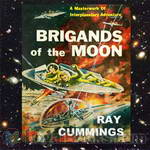 Brigands of the Moon
Brigands of the Moon
Gregg Haljan was aware that there was a certain danger in having the giant spaceship Planetara stop off at the moon to pick up Grantline’s special cargo of moon ore. For that rare metal — invaluable in keeping Earth’s technology running — was the target of many greedy eyes. But nevertheless he hadn’t figured on the special twist the clever Martian brigands would use. So when he found both the ship and himself suddenly in their hands, he knew that there was only one way in which he could hope to save that cargo and his own secret — that would be by turning space-pirate himself and paying the Brigands of the Moon back in their own interplanetary coin. (From the Gutenberg e-text) | |
 The Girl in the Golden Atom
The Girl in the Golden Atom
While examining a golden ring under a microscope, a chemist discovers a sub-atomic world. During his examination of this world he sees a beautiful young girl. After developing chemicals that will allow him to either shrink or grow larger in size, he and three friends journey to this small world. | |
 The World Beyond
The World Beyond
Lee Anthony finds himself and two of his friends kidnapped and taken on a strange voyage. | |
 Fire People
Fire People
In effect Professor Newland declared that the curious astronomical phenomena of the previous November--the new "stars" observed, the two meteors that had fallen with their red and green light-fire--were all evidence of the existence of intelligent life on the planet Mercury. (An excerpt from chapter 1. ) | |
 Wandl the Invader
Wandl the Invader
There were nine major planets in the Solar System and it was within their boundaries that man first set up interplanetary commerce and began trading with the ancient Martian civilization. And then they discovered a tenth planet--a maverick! This tenth world, if it had an orbit, had a strange one, for it was heading inwards from interstellar space, heading close to the Earth-Mars spaceways, upsetting astronautic calculations and raising turmoil on the two inhabited worlds. But even so none suspected then just how much trouble this new world would make... | |
 Tarrano the Conqueror
Tarrano the Conqueror
In "Tarrano the Conqueror" is presented a tale of the year 2430 A.D.--a time somewhat farther beyond our present-day era than we are beyond Columbus' discovery of America. My desire has been to create for you the impression that you have suddenly been plunged forward into that time--to give you the feeling Columbus might have had could he have read a novel of our present-day life. To this end I have conceived myself a writer of that future time, addressing his contemporary public. You are to imagine... | |
 Phantoms of Reality
Phantoms of Reality
Red Sensua's knife came up dripping—and the two adventurers knew that chaos and bloody revolution had been unleashed in that shadowy kingdom of the fourth dimension. | |
 Jetta of the Lowlands
Jetta of the Lowlands
Fantastic and Sinister Are the Lowlands into Which Philip Grant Descends on His Dangerous Assignment. | |
 Man on the Meteor
Man on the Meteor
Nemo's first memory is of waking up on a self-contained world on a meteor in the rings of Saturn. Soon he meets Nona, and together they explore their world. New discoveries, hidden wonders, and an entire civilization are tucked away on the little meteor. Originally published as a serial in Science and Invention magazine, from January to September 1924. | |
 Flame Breathers
Flame Breathers
Did the planet Vulcan exist? It supposedly orbited our sun on the opposite side from the Earth but it was only theoretical speculation. One expedition had mysteriously disappeared, and now another was following in its path—searching for the truth about this planet's existence. Was there really an unknown menace that stalked Vulcan's shadowed gorges." This was first published in Planet Stories March 1943. | |
By: Raymond Z. Gallun (1911-1994) | |
|---|---|
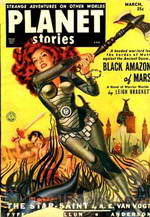 Asteroid of Fear
Asteroid of Fear
John Endlich needed to clean up his act. Gambling, drinking, a hot temper and wanderlust were the last things Rose and the kids needed. So he went to the Homesteaders Office and signed up to terraform Vesta, a chunk of a once thriving alien planet that had exploded from within; a flat lump of crust which was now the remains of a farm on one side and a mining operation on the other. The miners hated Endlich and sabotaged his plans at every opportunity. They were going to kill him and his family if he didn’t find a way to stop them. - Asteroid of Fear was first published in the March, 1951 edition of Planet Stories magazine. | |
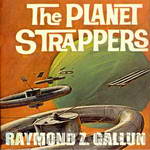 The Planet Strappers
The Planet Strappers
The Planet Strappers started out as The Bunch, a group of student-astronauts in the back room of a store in Jarviston, Minnesota. They wanted off Earth, and they begged, borrowed and built what they needed to make it. They got what they wanted--a start on the road to the stars--but no one brought up on Earth could have imagined what was waiting for them Out There! | |
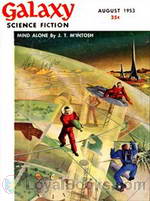 Stamped Caution
Stamped Caution
When an alien spacecraft crashes in Missouri a team of army investigators is dispatched. Among the debris they find a Martian infant and decide to raise him in their lab. Is he too strange to form a relationship with humans? Maybe, but he does have cute eye-stalks. – Stamped Caution was first published in the August 1953 issue of Galaxy magazine. | |
 People Minus X
People Minus X
A disastrous experiment destroys the moon and kills millions on earth. The invention of artificial flesh lets them return to life as androids, a second and perhaps superior human species. Mounting tensions between the naturals and the “phonies” erupts in violence. Will this scientific advance bring eternal life and the gift of travel to the stars or bring about mankind’s self-destruction? | |
By: Richard Jefferies (1848-1887) | |
|---|---|
 After London, or Wild England
After London, or Wild England
First published in 1885, After London, or Wild England is considered to be one of the earliest instances of post-apocalyptic fiction, describing the effects of an unspecified catastrophe that dramatically changes the face of England and its population. Divided into two parts, the first depicts the fall of civilization, as society reverts to its more primitive roots, while the second part is set years after the apocalyptic event and examines the evident changes in both natural scenery and social structure... | |
By: Richard Mace Elam (1920-2013) | |
|---|---|
 Young Readers Science Fiction Stories
Young Readers Science Fiction Stories
This 1957 book contains thirteen pre-space-exploration stories for young readers. Some of the details show their dated composition but the sense of adventure will still hold attention for the young. - Summary by david wales | |
 Teen-Age Super Science Stories
Teen-Age Super Science Stories
Suspenseful stories about space travel and exploration of other planets. - Summary by TR Love | |
By: Richard Sabia | |
|---|---|
 I Was a Teen-Age Secret Weapon
I Was a Teen-Age Secret Weapon
Poor Dolliver Wims is a terribly misunderstood teen age boy from the backwoods. Is he mean or evil? Quite the opposite: He does nothing wrong, hurts no one and wants only to be liked and to help, yet he seems to be blamed for every accident that ever happens to anyone in the University research facility where he 'works' as a porter. Why does disaster seem to swirl around him like a tornado whips around it's eye. He never is hurt in the slightest way while others slash themselves with previously innocent knives, are smashed by falling bookcases that had no cause to fall, and are shot by guns that are safely tucked away... | |
By: Robert Bloch | |
|---|---|
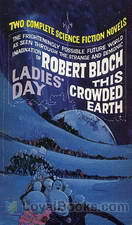 This Crowded Earth
This Crowded Earth
Robert Bloch was a prolific writer in many genres. As a young man he was encouraged by his mentor H. P. Lovecraft, and was a close friend of Stanley G. Weinbaum. Besides hundreds of short stories and novels he wrote a number of television and film scripts including several for the original Star Trek. In 1959 Bloch wrote the novel Psycho which Alfred Hitchcock adapted to film a year later. He received the Hugo Award, the World Fantasy Award, the Bram Stoker Award, and he is a past president of the Mystery Writers of America. Published in Amazing Stories in 1958, This Crowded Earth is a thriller set on an overpopulated Earth of the future. | |
By: Robert E. Howard (1906-1936) | |
|---|---|
 Devil in Iron
Devil in Iron
Conan's lustful desires again get him into a whole pile of trouble. This time the beautiful, golden haired, noble born Octavia, lures him into a fiendish trap set by his most powerful enemies and from which there seems to be no escape. But on the long deserted island of Xapur where he goes to capture this crafty beauty, it is not just mortal enemies that await him; Khosatral Khel a demon that crawled up from the abyss many eons ago and is of a substance as hard as iron has been awakened and is intent on crushing Conan and the woman like bugs for it's amusement... | |
 Jewels of Gwahlur
Jewels of Gwahlur
Conan The Barbarian is after fabulous treasure in this exciting story. But he finds himself in more difficulties than he had counted on. Crafty and powerful human opponents seek to skin him alive, bestial mutations seek to rip his arms off, denizens of the deep want to devour him whole and scantily clad dusky beauties try to waylay him at every step. And all of this to find the Jewels of Gwahlur, the most fabulous treasure every hidden in a secret temple. Has Conan finally met his match? Will his evil enemies or the seductive women finally succeed in making him beg for mercy? Listen and find out... | |
 Beyond the Black River
Beyond the Black River
Conan the Barbarian is employed by one of the civilized countries to help in it's push to claim lands from the primitive Picts. The Picts are not excited about the idea however. Old gods and mythical creatures are called up by the Pict witches to contest the invading army and Conan finds himself battling for his life amid the blood thirsty hordes that include saber-toothed tigers, 40 foot long venomous snakes and a demon from another dimension who is intent on crushing him. The huge dog Slasher makes an appearance here and distinguishes himself so well in a doomed battle to delay their forces that Conan openly praises his courage and pledges that 7 Pict heads will roll in his honor. | |
 Witch Shall Be Born
Witch Shall Be Born
The kingdom of Khauran is admittedly a small one, nestled between the vast desert and the plains, but it is blessed with an abundance of rich soil, hard working devoted inhabitants and much gold but most of all by a sweet young queen who is as wise and beneficent as she is beautiful. But then from out of nowhere, disaster strikes. A horrible witch (her evil twin sister) secretly replaces her and introduces devil worship, human sacrifice and other things too repulsive to mention. Conan, who was the captain of her guard is captured and crucified in the desert... | |
 Queen of the Black Coast
Queen of the Black Coast
Conan finally meets his match in Belit, the fierce, bloodthirsty and scantily clad pirate Queen. She also is unable to resist the huge, blue eyed, iron thewed barbarian who literally sweeps her off her feet. Together they become pirates of legend and are the scourge of the Black Coast. They venture up the river of death where no one has gone in centuries and lived, in search of plunder, battle and adventure. And get get more of all three than they could wish for. | |
 Shadows in Zamboula (version 2)
Shadows in Zamboula (version 2)
In the dark streets of Zamboula, huge ghouls stalk the night seeking victims for their ghastly rites and feasts. Conan is passing through this city and is almost a victim but escapes, only to rush to the aid of a beautiful, voluptuous maiden still in their horrible talons. Swords flash, thews are strained and the mighty Conan almost meets his match in the temple of the monkey god. Will he escape? Will he get the girl? Listen and marvel! Excellent story, well told as always by Howard. Summary by phil chenevert | |
By: Robert Emmett McDowell (1914-1975) | |
|---|---|
 Citadel of the Green Death
Citadel of the Green Death
At the coldly gleaming Experimental Station they flung this choice in Outlaw Joel Hakkyt's teeth: "Grinding, endless slavery on Asgard, that Alpha Centauri hell—or a writhing, screaming guinea-pig's death here?" He chose Asgard, naturally. But what was natural—on Asgard? - Summary by Robert Emmett Mcdowell | |
By: Robert F. Young (1915-1986) | |
|---|---|
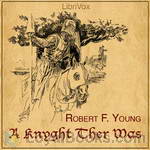 A Knyght Ther Was
A Knyght Ther Was
"But the Knyght was a little less than perfect, and his horse did not have a metabolism, and his 'castle' was much more mobile - timewise! - than it had any business being!" In 2178, once time travel had become a simple task, it had also been outlawed. Those who chose to ingnore this law were known as time-thieves, and Tom Mallory was among the best of them. When he learns the precise whereabouts of the Holy Grail in 542, he sets out to obtain it with the intention of returning it to the 22nd century to make a handsome profit and to settle on Get-Rich-Quick Street... | |
By: Robert Hugh Benson (1871-1914) | |
|---|---|
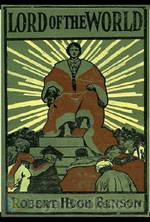 Lord of the World
Lord of the World
“Mr. Benson sees the world, four or five generations hence, free at last from all minor quarrels, and ranged against itself in two camps, Humanitarianism for those who believe in no divinity but that of man, Catholicism for those who believe in no divinity but that of God.” This apocalyptic novel from the early 1900's is sometimes deemed one of the first modern dystopias. | |
 Dawn of All
Dawn of All
In a former book, called "Lord of the World," I attempted to sketch the kind of developments a hundred years hence which, I thought, might reasonably be expected if the present lines of what is called "modern thought" were only prolonged far enough; and I was informed repeatedly that the effect of the book was exceedingly depressing and discouraging to optimistic Christians. In the present book I am attempting -- also in parable form -- not in the least to withdraw anything that I said in the former,... | |
By: Robert Moore Williams (1907-1977) | |
|---|---|
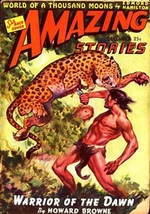 Planet of the Gods
Planet of the Gods
Far, far in the future Earth has achieved real peace and is sending out interstellar expeditions, not to conquer, but to explore. The third such expedition, has made it to the Vega system and discovered to everyone's amazement, not only a solar system but two worlds circling the Vega sun that seem to have atmosphere and water. And apparently intelligent life is there as well as well because something tries, and almost succeeds, in blasting the expedition ship out of space before it can even get close to either one... | |